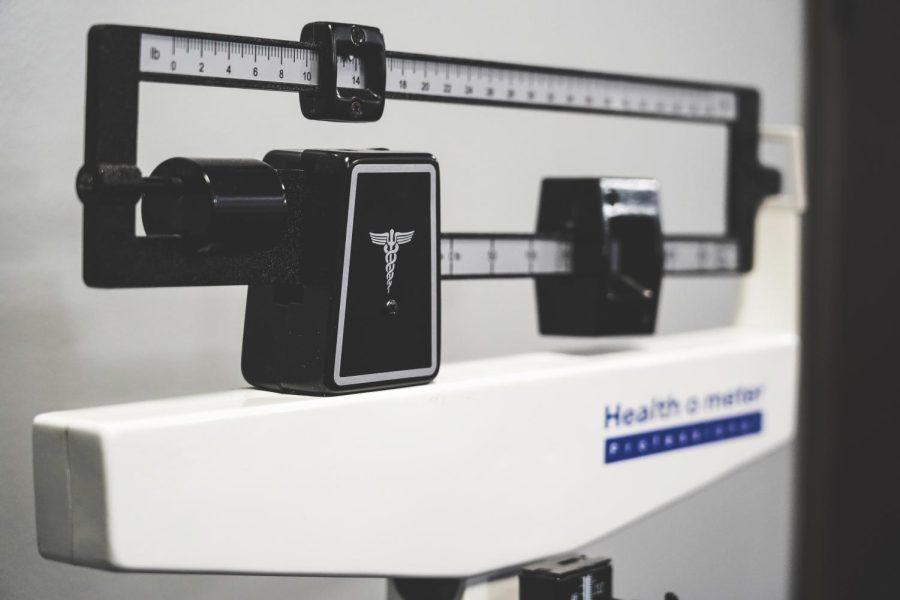For wrestlers in the era when head wrestling coach Tim Marzuola competed, making weight sometimes meant sitting in a sauna and letting your sweat pour.
“Fifty-some years ago, there was no talk about healthy eating for healthy weight loss,” he said. “Usually, wrestlers taught wrestlers how to cut weight and it was [in] all the wrong ways.”
Wrestlers monitor and control their weight in order to compete in their weight class at meets.
Weight classes determine how wrestlers are matched up in competitions because wrestlers’ weights should be similar to be evenly matched. Each weight class has a maximum weight, and if the wrestler exceeds it, they can’t compete in that class. In UIL wrestling, there are 14 weight classes for boys and 10 for girls.
“Every wrestler weighs in before the meet, whether it’s a tournament or whether it’s a dual, and you’re allowed to move a wrestler up or down one weight class but no more,” Marzuola said.
Most wrestlers pay attention to their weight so that meets go smoothly and weight class changes can happen as needed. However, tactics to make weight like sweating out water can lead to dehydration and electrolyte imbalances.
“In theory, if one of those electrolytes such as sodium or potassium gets too high, that can cause other issues in the body that may even affect your kidneys and your heart,” said Dr. John Scovell, an orthopedic surgeon and sports medicine specialist. “It’s really rare, but it is a possibility.”
He recommends that wrestlers make enough time before a meet to prepare to make weight safely.
“You would really want to start the process a couple of weeks ahead of time, so you’re limiting your intake or watching your weight in a more calculated, measured manner slowly over time and not rapidly in a short amount of time,” Scovell said.
However, he believes that unhealthy methods for cutting weight aren’t common nowadays.
“I think, overall, the athletes today, even wrestlers, take much better care of themselves than compared to back in the day,” Scovell said. “We just have so much more knowledge about better eating and better training and staying hydrated.”
Marzuola said he encourages proper eating and training and discourages the unhealthy tactics he saw in his youth.
“In the last 20-plus years, there’s a lot more information about nutrition out there and we really emphasize kids’ [health],” he said.
He meets with parents twice a year to emphasize the importance of healthy food and tries to build lifelong nutrition habits in the athletes he coaches.
“An athlete is kind of like a Lamborghini,” Marzuola said. “You don’t put regular fuel in a Lamborghini, you put high grade food in a Lamborghini, so it can operate or run at the speed it’s intended to. With an athlete, you don’t put junk food in an athlete and expect [them] to perform.”
He also takes steps to make sure wrestlers don’t drop their weights too low following state and national guidelines to protect wrestlers. Before the season begins, Marzuola has his wrestlers weigh in and take hydration and body fat percentage tests. Using the results of the tests and the weight on that particular day, called the alpha weight, he can calculate the lowest possible healthy weight for a wrestler.
“It also limits how much weight they can lose per week,” he said. “So, you cannot have a kid losing 10 or 15 pounds every week to get down to a particular weight class, because they limit how much weight they can lose and it’s 1.5 percent of their alpha weight.”
For example, a wrestler who originally weighed 200 pounds can lose at most 3 pounds per week.
“Sometimes you will have big kids that might weigh 240 pounds and with their body fat could get down as low as 170,” Marzuola said. “Of course, we never pull 70 pounds off of a kid to get down there, but a lot of times, most of our kids will lose some weight and a lot of them will lose the weight getting in better shape.”
Sophomore JV wrestler Matthew Winford said how restrictive a wrestler will be to make weight depends on the person’s individual limits.
“For me, I know that if I go 24 hours without eating, I will be fine because my metabolism is, I guess, set up for that,” he said. “But over 24 hours, I know that would be unhealthy for me. Wrestling does have this stigma [of wrestlers not eating] for an entire week to get as light as possible, but that’s not what we do anymore.”
Wrestlers tend to avoid participating in unhealthy practices to make weight because it impacts performance in the actual match beyond the weigh in.
“You shouldn’t push yourself in [that way] because then you’re lowering your physicality,” sophomore wrestler Gabe Pedack said. “When you do something unhealthy, you’re not going to wrestle that well. Typically people don’t tell you to do that.”
In Winford’s experience, it’s ultimately up to the wrestlers themselves to make the right diet choices ahead of a meet.
“Neither the coaches nor the captains will [tell a wrestler] that they need to hurt themselves in order to get to a weight,” Winford said. “I 100% believe that both the captains and the coaches, the first thing that comes [for] them and for us is our health and our happiness in our sport.”




